Bräunig, Werner (2007), Rummelplatz, Aufbau Verlag
ISBN 978-3-7466-2460-0
 Generally, I’m fond of complaining about fine German books that have not been translated into English yet, especially those that have been out and available for a while. It’s somewhat different with Rummelplatz, Werner Bräunig’s famous novel, written 1965. True enough, Rummelplatz is a fine piece of work, one of the best books to come out of the tumultuous environment that was the German Democratic Republic (GDR) in the 1960s; although Bräunig himself can scarcely be called one of the best writers of the period. Written in different voices, with varying degrees of success, this 600 page novel seems to be carved from a wealth of raw material, barely ordered and refined. To the unsuspecting reader, Rummelplatz can seem like a heavy freight train, full of impressions and ideas, full of precise observations and broad essayistic reflections, its characters flawed archetypes, ripped roughly from the thread of German literary tradition rather than sympathetically drawn and vivid literary creations. The whole of Rummelplatz seems to cohere only because of the immense will of its author. It is Bräunig’s vision that holds it all together, the whole vibrant, violent, passionate, amazing mess that is Rummelplatz, Bräunig’s first and only novel. Its achievement is all the more stunning, given how small, quiet, unimpressive Bräunig’s short stories are. Although their flaws are present in the novel as well, it succeeds on account of the energy and power that pulses through it. So why has it not been translated yet? Largely, one would have to say, because it has not been published until 2007. Excerpts circulated, rumors abounded, and in discussions of early GDR literature, Bräunig’s work always had pride of place because of the central role he played in the development of the so-called Bitterfelder Weg. Due to politically nocent developments, Bräunig’s manuscript for Rummelplatz had been suppressed in 1965, and subsequently swept under the rug, a lost, unpublished masterpiece. Until, that is, Angela Drescher and the East German publisher Aufbau Verlag decided to resurrect the book, edit and publish it prominently. The author never found out about the renaissance of his critical and popular reputation: he died in 1976 of a disease related to his alcoholism.
Generally, I’m fond of complaining about fine German books that have not been translated into English yet, especially those that have been out and available for a while. It’s somewhat different with Rummelplatz, Werner Bräunig’s famous novel, written 1965. True enough, Rummelplatz is a fine piece of work, one of the best books to come out of the tumultuous environment that was the German Democratic Republic (GDR) in the 1960s; although Bräunig himself can scarcely be called one of the best writers of the period. Written in different voices, with varying degrees of success, this 600 page novel seems to be carved from a wealth of raw material, barely ordered and refined. To the unsuspecting reader, Rummelplatz can seem like a heavy freight train, full of impressions and ideas, full of precise observations and broad essayistic reflections, its characters flawed archetypes, ripped roughly from the thread of German literary tradition rather than sympathetically drawn and vivid literary creations. The whole of Rummelplatz seems to cohere only because of the immense will of its author. It is Bräunig’s vision that holds it all together, the whole vibrant, violent, passionate, amazing mess that is Rummelplatz, Bräunig’s first and only novel. Its achievement is all the more stunning, given how small, quiet, unimpressive Bräunig’s short stories are. Although their flaws are present in the novel as well, it succeeds on account of the energy and power that pulses through it. So why has it not been translated yet? Largely, one would have to say, because it has not been published until 2007. Excerpts circulated, rumors abounded, and in discussions of early GDR literature, Bräunig’s work always had pride of place because of the central role he played in the development of the so-called Bitterfelder Weg. Due to politically nocent developments, Bräunig’s manuscript for Rummelplatz had been suppressed in 1965, and subsequently swept under the rug, a lost, unpublished masterpiece. Until, that is, Angela Drescher and the East German publisher Aufbau Verlag decided to resurrect the book, edit and publish it prominently. The author never found out about the renaissance of his critical and popular reputation: he died in 1976 of a disease related to his alcoholism.
In the end, Bräunig fell victim to policies that he himself helped create, an aesthetic that is clearly instrumental in the way Rummelplatz was written. These policies are, as I just mentioned, commonly referred to as the Bitterfelder Weg, i.e. the ‘Bitterfelder way’, so named after a writer’s conference in Bitterfeld, a drab and dreary industrial town in Saxony-Anhalt (an eerily fitting place). The Bitterfelder Weg, a set of official directives, was a complex of ideas that sought to bridge the apparent gap between writers and workers. This was coupled with an appeal, which Bräunig was instrumental in writing, called “Greif zur Feder, Kumpel”, which could be translated as “Miners, take up the pens!”. In accordance with the tenets of the Bitterfelder Weg, dozens of writers went to work (or were made to work) in factories and in mines, in order to better understand the workers’ reality. The basic idea was that too many writers writing ‘what they know’ (to echo the old writing advice) led to a literature concerned with upper-class concerns, drawing-room intrigues, and elite discussions, in short, a body of work that workers could not relate to. The best way to amend this, officials thought, was for writers to get to know real workers, to understand how hands-on work was done (Ayn Rand’s odd phantasmagorias are a gruesome example of not understanding what modern day industrial work looks like on the factory floor). This generally sound idea was undermined by two things. First, the fact that it was often implemented by force, and second, the fact that instead of merely enlarging the ‘what they know” part of the formula (and thus encouraging writers to include everyday work experience in a meaningful and correct way in their prose), officials soon rather emphasized the ‘what’ part. The Bitterfelder Weg turned into the GDR version what has been known as socialist realism since the 1930s, an aesthetic that demanded of writers to only (or at least predominantly) write realistically (although that term isn’t defined as you’d think it’d be) and about everyday life. It was buttressed by the directives that were encouraging workers to write (which is the “Miners, take up the pens!” part of the whole construction). Within a few years, every sizable company had a writing collective and writing workshops.
These workshops were often held by some of the leading writers of the time, and could, sometimes, produce intriguing results. Traces of that interaction can be found in all kinds of works, but perhaps most noticeably in Brigitte Reimann’s brilliant novels (also, sadly, inexcusably, untranslated, including her masterpiece Franziska Linkerhand). The Bräunig-penned appeal was published in 1959, and on the plus side it led to a plethora of art from unexpected places. Details and descriptions connected to the everyday reality of workers came up in novels, stories and plays of the period. Quickly, however, the negative aspects of the doctrine were felt, especially two of them. One was the rising amount of indoctrinated literature. Workers in their writing workshops were gently guided in how to properly write, how to talk about workers, power and the bourgeoisie, how to talk about the party, and which theories to use, implement and cite. That was because those workshops that were not held by genuine writers, were held by people loyal to the socialist party, and they had a very definite idea of what kind of literature was worth writing (and reading) and which wasn’t. As a result of these indoctrinated workshops, professional writers were suddenly asked to also do as the workers did. After all, in the GDR, workers and peasants were, in theory, on moral high ground. They did the right thing because they were workers. Of course, this theory had little to do with actual workers, but party officials were often blissfully unaware of contradictions like that. In time, these contradictions and the ideological pressure on what kind of content was considered appropriate for literary production led to a very difficult situation. While officials said that they wanted writers to pursue a brand of realism, this realism did not in fact include intransigently negative depictions of everyday life on the factory floor. Literature, it was officially maintained, needed to teach people something, and help them understand their life, their country and most of all the revolutionary process better, but most of all, it was educational, supposed to make everyone involved into a better, more useful citizen. Being a communist was a good thing only if it meant you were uncritically useful. Books like Rummelplatz, with its searing (but fundamentally communist) criticism of the status quo, were deemed corruptive.
 In the West, we like to read opposition against socialist regimes along anti-communist lines, which explains in part the perennial popularity of a royalist like Solzhenitsyn. But the sad truth was that the GDR government targeted passionate communists as well as the anti-communist opposition. Passionate communists like Heiner Müller, Christa Wolf or Werner Bräunig decried what they saw as perversions of a noble and magnificent ideal, and they were punished accordingly. One of the best examples of the line between ‘good’ and ‘bad’ communism is the difference between the novel Spur der Steine (~ Traces of Stones) and its film version. The novel, written by Erik Neutsch is a long, and ultimately dull affair. It starts off well, telling the story of an outsider and his adventures, but ends in a long coda of basically educational remarks. In the end, Neutsch’s protagonist sees the error of his ways and becomes a useful cog in the GDR machine. This doesn’t happen in Frank Beyer’s fantastic film version, also entitled Spur der Steine. The film is a stronger work of art because it’s more coherent and more loyal towards its protagonist. It was however this realism unsupported by an educational finish that earned the movie the ire of GDR officials, so that it was eventually banned, a ban that in the end included Neutsch’s novel. Both Neutsch and Beyer were passionate and outspoken communists and supporters of the German Democratic Republic, yet they failed what GDR officials saw as the main function of literature. If you look at the process that eventually led to such bans, you are likely to be surprised by the almost random nature of it. Sometimes writers appeared to be equally surprised or even blindsided by the sudden onslaught of official criticism and the subtle and not-so-subtle ways of repression that ensued. Writers like Bräunig did not write oppositional literature against a dictatorial regime. In 1965, before the erection of the Berlin Wall, many writers believed the party line which proclaimed that debate was integral to the young socialist republic. What they forgot was that the other party line was “the Party’s always right” (there’s actually an official hymn, the refrain of which is “the Party, the Party, the Party’s always right.” click here to listen and cringe) and highlighting mistakes impudently suggested that the Party may not, in fact, always be right.
In the West, we like to read opposition against socialist regimes along anti-communist lines, which explains in part the perennial popularity of a royalist like Solzhenitsyn. But the sad truth was that the GDR government targeted passionate communists as well as the anti-communist opposition. Passionate communists like Heiner Müller, Christa Wolf or Werner Bräunig decried what they saw as perversions of a noble and magnificent ideal, and they were punished accordingly. One of the best examples of the line between ‘good’ and ‘bad’ communism is the difference between the novel Spur der Steine (~ Traces of Stones) and its film version. The novel, written by Erik Neutsch is a long, and ultimately dull affair. It starts off well, telling the story of an outsider and his adventures, but ends in a long coda of basically educational remarks. In the end, Neutsch’s protagonist sees the error of his ways and becomes a useful cog in the GDR machine. This doesn’t happen in Frank Beyer’s fantastic film version, also entitled Spur der Steine. The film is a stronger work of art because it’s more coherent and more loyal towards its protagonist. It was however this realism unsupported by an educational finish that earned the movie the ire of GDR officials, so that it was eventually banned, a ban that in the end included Neutsch’s novel. Both Neutsch and Beyer were passionate and outspoken communists and supporters of the German Democratic Republic, yet they failed what GDR officials saw as the main function of literature. If you look at the process that eventually led to such bans, you are likely to be surprised by the almost random nature of it. Sometimes writers appeared to be equally surprised or even blindsided by the sudden onslaught of official criticism and the subtle and not-so-subtle ways of repression that ensued. Writers like Bräunig did not write oppositional literature against a dictatorial regime. In 1965, before the erection of the Berlin Wall, many writers believed the party line which proclaimed that debate was integral to the young socialist republic. What they forgot was that the other party line was “the Party’s always right” (there’s actually an official hymn, the refrain of which is “the Party, the Party, the Party’s always right.” click here to listen and cringe) and highlighting mistakes impudently suggested that the Party may not, in fact, always be right.
 This is a rather long introduction that leads us to Werner Bräunig’s excellent book, large portions of which take place among miners and in a paper factory. in the years leading up to 1953 Bräunig was not himself a miner or a paper factory worker by profession, but he did work as a miner for a year, and in a paper factory for two more years. Although he had embarked on a career in literature and academia when the Bitterfelder Weg directives were given out, Rummelplatz closely reflects the ideals that were behind the cultural policies decided in Bitterfeld. It is a story about the everyday reality of miners in the Wismut AG in Saxony and of paper factory workers in Chemnitz, and it’s painstakingly accurate about all kinds of details. My own grandfather had worked in mines for most of his adult life, two years of which were spent with the Wismut AG. I talked to him after reading the book and he corroborates all the details, down to even the smallest observations, of life in the Wismut mines. The Wismut mines were uranium mines, and thus of central strategic importance not just to the GDR officials, but also to the Soviet occupying forces. Daily life in Wismut meant having a Russian military officer as a boss, and seeing Soviet soldiers everywhere. Every miner leaving the mines at the end of the day was closely controlled and information about the mines operated by the Wismut AG, was slow in coming. On the other hand, of all the mining work in the GDR, the Wismut mines offered the best wages by far, and thus attracted workers from all over the Republic. A 1958 movie by Konrad Wolf, Sonnensucher (unreleased until 1972) is enlightening if you want to understand the heated atmosphere in the uranium mines where all kinds of people came to work. Bräunig’s potent mixture of characters is less a feat of imaginative invention than a reflection of the torrid reality of the uranium mine work. In his book, he assembles, among many other colorful characters, a brawler and misfit, a Party official, an alcoholic Soviet engineer, and a young man who works in the mines in order to ‘make up’ for his non-working-class background and be allowed to study at a university later on.
This is a rather long introduction that leads us to Werner Bräunig’s excellent book, large portions of which take place among miners and in a paper factory. in the years leading up to 1953 Bräunig was not himself a miner or a paper factory worker by profession, but he did work as a miner for a year, and in a paper factory for two more years. Although he had embarked on a career in literature and academia when the Bitterfelder Weg directives were given out, Rummelplatz closely reflects the ideals that were behind the cultural policies decided in Bitterfeld. It is a story about the everyday reality of miners in the Wismut AG in Saxony and of paper factory workers in Chemnitz, and it’s painstakingly accurate about all kinds of details. My own grandfather had worked in mines for most of his adult life, two years of which were spent with the Wismut AG. I talked to him after reading the book and he corroborates all the details, down to even the smallest observations, of life in the Wismut mines. The Wismut mines were uranium mines, and thus of central strategic importance not just to the GDR officials, but also to the Soviet occupying forces. Daily life in Wismut meant having a Russian military officer as a boss, and seeing Soviet soldiers everywhere. Every miner leaving the mines at the end of the day was closely controlled and information about the mines operated by the Wismut AG, was slow in coming. On the other hand, of all the mining work in the GDR, the Wismut mines offered the best wages by far, and thus attracted workers from all over the Republic. A 1958 movie by Konrad Wolf, Sonnensucher (unreleased until 1972) is enlightening if you want to understand the heated atmosphere in the uranium mines where all kinds of people came to work. Bräunig’s potent mixture of characters is less a feat of imaginative invention than a reflection of the torrid reality of the uranium mine work. In his book, he assembles, among many other colorful characters, a brawler and misfit, a Party official, an alcoholic Soviet engineer, and a young man who works in the mines in order to ‘make up’ for his non-working-class background and be allowed to study at a university later on.
 The central image of the Rummelplatz (~ fairground) is the place where the miners meet with the community around them; it is also the place where rules carry less weight, and people behave differently. The fairground acts as the outlet for all the trouble and annoyance and pain that accumulates during work. People drink, fight, fuck and socialize on the fairground. In essence, within the novel, the role of the Rummelplatz is similar to the role that Bakhtin attributed to the carnivalesque. The sobriety, accuracy and somber nature of the main narrative dissolves into a sensual, desperate frenzy on the fairground. This is also true for Bräunig’s writing. Mostly, Bräunig’s style is indebted to the Neue Sachlichkeit, a style current in 1920s Germany. Unlike the great new writers of his age, i.e. Uwe Johnson, Irmtraud Morgner, Günter Grass, Wolfgang Koeppen or Christa Wolf, Bräunig cannot escape the shackles of the style that dominated German literature up until the end of WWII. The moments of madness, of the carnivalesque, are the only instances of Bräunig giving his language freer rein, touching on something bigger; but even this loose, jacked-up language lacks originality: at his best, Bräunig (infrequently) manages to sound a bit like the Döblin of Berlin Alexanderplatz (which is of course high praise). On the other hand, since the whole novel is a mix of registers and voices, the style, which vacillates between Johannes Pinneberg, Hans Fallada’s hapless hero, and Franz Biberkopf, Döblin’s, does fit the overall structure of the novel very well. It is split up into smaller bits of story, each of which follows one particular character in his odyssey through post-war socialism. Some characters have two pages of text, others turn up all the time. This makes for a very fragmented, lively and exiting read. As the editor, disingenuously, explains in the afterword, the manuscript was actually even more fragmented, because it wasn’t arranged chronologically. Assuming this to be a mistake the editor re-arranged the chapters (only one of many questionable editorial decisions). But it’s not just the characters that alternate, it’s also the places. The three main places of action are the Wismut mines near Chemnitz, the paper factory in Chemnitz, and a paper factory in West Germany.
The central image of the Rummelplatz (~ fairground) is the place where the miners meet with the community around them; it is also the place where rules carry less weight, and people behave differently. The fairground acts as the outlet for all the trouble and annoyance and pain that accumulates during work. People drink, fight, fuck and socialize on the fairground. In essence, within the novel, the role of the Rummelplatz is similar to the role that Bakhtin attributed to the carnivalesque. The sobriety, accuracy and somber nature of the main narrative dissolves into a sensual, desperate frenzy on the fairground. This is also true for Bräunig’s writing. Mostly, Bräunig’s style is indebted to the Neue Sachlichkeit, a style current in 1920s Germany. Unlike the great new writers of his age, i.e. Uwe Johnson, Irmtraud Morgner, Günter Grass, Wolfgang Koeppen or Christa Wolf, Bräunig cannot escape the shackles of the style that dominated German literature up until the end of WWII. The moments of madness, of the carnivalesque, are the only instances of Bräunig giving his language freer rein, touching on something bigger; but even this loose, jacked-up language lacks originality: at his best, Bräunig (infrequently) manages to sound a bit like the Döblin of Berlin Alexanderplatz (which is of course high praise). On the other hand, since the whole novel is a mix of registers and voices, the style, which vacillates between Johannes Pinneberg, Hans Fallada’s hapless hero, and Franz Biberkopf, Döblin’s, does fit the overall structure of the novel very well. It is split up into smaller bits of story, each of which follows one particular character in his odyssey through post-war socialism. Some characters have two pages of text, others turn up all the time. This makes for a very fragmented, lively and exiting read. As the editor, disingenuously, explains in the afterword, the manuscript was actually even more fragmented, because it wasn’t arranged chronologically. Assuming this to be a mistake the editor re-arranged the chapters (only one of many questionable editorial decisions). But it’s not just the characters that alternate, it’s also the places. The three main places of action are the Wismut mines near Chemnitz, the paper factory in Chemnitz, and a paper factory in West Germany.
The part of the narrative that takes place in the Wismut mines especially follows the fates of three particular characters. There is Peter Loose, a disaffected, confused, but capable miner who likes girls, alcohol and bar fights. Eventually, his carefree ways will get him into conflict with the law, until his imprisonment for politically motivated reasons in the last third of the novel. There’s, Christian, the aforementioned young man who wants to study. He comes to mining wholly innocently, and his first weeks in the mine almost break his back, but through hard and conscientious work he eventually becomes a fine miner, earning more money than most older or established miners. The third is Fischer, an old Party official, who’d been imprisoned by the National Socialists during WWII, and who’s a thoroughly likable character, a ‘good’ communist, who believes that Marxism is supposed to serve the people rather than the other way around. His tragedy is that his reading of Marxism is on the way out, while mindless bureaucracy is in. His daughter is the main character in those sections that focus on the nearby paper factory. This factory lacks workers, because every able-bodied man on the factory floor is trying to get a job in the mines, and early in the book, she suggests that they could let women operate the machines as well. Eventually, she’s allowed on the factory floor and despite several struggles, she prevails, and earns the respect of her fellow workers. There are two noteworthy aspects about these stories. One is the absolutely soapy quality of these story lines. If the background had been drawn less urgently, and if the overall vision and coherence had been even just a tad less powerful, these stories would have sunken like stones into the muck of literary irrelevance. The other aspect is that all of these story lines can be used to extrapolate harsh criticism of the GDR. There are repressive bureaucrats, there is rampant sexism, and discrimination against white collar children. But it would be a mistake to jump from this criticism to an indictment of communism. As one character says:
[J]a freilich, das ist bei Marx nicht vorgesehen. Es ist vom Kommunismus das genaue Gegenteil. Aber leider sehen wir ja immer mal wieder, was einer in Marx’ Namen aus Marx machen kann, sofern er nur rechthaberisch und unfähig genug ist.
(~ Of course, this has not been intended by Marx. This is the exact opposite of Communism. But regrettably we keep seeing what people can turn Marx into in Marx’ name if they are dogmatic and inept enough)
It’s quite important to remember that socialist writers in the 1960 were faced with a disintegrating dream, as communism was slowly subverted, dismantled and destroyed by brutal, dull and single-minded officials. As I said, there is an easy narrative in the West that dissident literature in East Germany was engaged in a struggle against Communism – not so. Many of the people treated harshest by the system were ardent communist, struggling in a system that perverted an ideology these writers considered to be liberating. And Bräunig highlights this predicament with a sharp eye.
Although Christa Wolf’s spectacular literary work (see my review) is probably the best literary indictment of this change in German literature, Rummelplatz shows us what Bräunig might have achieved, as well, had he finished his work. Rummelplatz is the first book of a two-part work, and the most cogent remarks about communism crop up in the later sections of the book; one assumes the second volume would have explored that direction further, especially given Bräunig’s remarks about West Germany and its role in the predicament of the GDR after the Soviet occupation. Throughout much of the book, Bräunig’s imprecise with his criticism, preferring to explore individual stories and what they have to say about the relationship of individuals vs. society. The only exception, except for the portions about communism near the end, is his treatment of West Germany. Both in the way he describes events in West Germany as well as in the way he mentions it, we are witnessing a no-holds-barred approach to the topic. Big corporations, we hear, left the GDR and tried to entice capable talents of moving into the West, as well. He makes clear that people with Nazi pasts saw West Germany as a safe haven and tried to pool their funds into that country where they could continue to cohabitate with fellow Nazis. We might want to remember that, however problematic, negligent and complex the Nazi purges were in the GDR after the 1950s, West Germany had Nazi governors, chancellors and judges. In fact, as we learned late last year, the ‘Butcher of Lyon’, Klaus Barbie, hiding in Bolivia, had been on the payroll of the German government in the 1960s. Also, as if he’s been prescient, Bräunig has a reply to all those who today claim that socialist economics are bound to fail, using the GDR economy as an example (and comparing it with the West German one):
Nun, nach fünfundvierzig habe es in Westdeutschland 120 Hochöfen gegeben, auf dem Gebiet der DDR aber […] nur fünf. Und mit anderen Dingen sei es ähnlich. […] “Wissen Sie, sagte Bauerfeld, “bis fünfundvierzig war dieses Ostdeutschland nichts weiter als ein großes Kartoffelfeld.”
(~ Well, after forty-five, West Germany had 120 blast furnaces, but the GDR only five. With other issues, it was similarly. “You know”, Bauerfeld said, “until forty-five East Germany had been nothing but one big potato field.”)
That said, Bräunig cannot be read as an apologist for the status quo. He’s well aware of the problems. The bureaucracy, inherited from the Third Reich, and a country full of Germans, who clung to old stereotypes, old prejudices, old kinds of hate and resentment. At one point he has a character say: this country is bound to fail unless we pull together, unless we change, unless we move forward.

It would not be surprising if it had been this kind of criticism that caused the book to be banned. Alas, that was not the case. Bräunig found himself at the center of a large campaign against ‘wrong’ kinds of books, after an excerpt from his novel-in-progress was published that contained fairly little such criticism. It was one of his carnivalesque scenes. In it, he wrote about the hunger and despair of these early years, he wrote about sexual appetites, about small fry violence and large scale binge drinking. These scenes are among those that ring most true in the whole book, but despite asking for realism in the Bitterfelder Weg doctrines, this is not the kind of realism that was demanded. These workers were not brilliant noble creatures, they were flawed, sweaty, horny men and women. Ultimately, this was unacceptable; what made it worse was the fact that Bräunig wrote about the hallowed uranium mines, which were quite generally a thorny subject. The above-mentioned Sonnensucher had also been banned immediately. It was released later in the brief period of artistic liberalization between 1972 and 1976, but by then Bräunig had fallen apart as writer and man. He published an ok collection of stories in 1969 and worked on another novel, but according to his editor, there wasn’t much to be excited about in these drafts. The tragedy of Bräunig’s squandered talent is brutal. My grandfather, who worked in various mines in the area that Rummelplatz is set in remembers a time of excitement, of hopes, of possibilities. Workers often felt empowered, and skill was often more respected than seniority or clout. This is the time that Bräunig portrays and this is the energy that suffuses this incredible book. There are countless flaws, inconsistencies etc. in it, but it’s only a draft, after all, never readied for publication. Bräunig’s not one of the great writers of his time. But he could have been. Translate this book! I provided but a very poor summary of the book that crawls with ideas and teems with life. Rummelplatz has similarities to books by writers like Anna Seghers and is historically fascinating, but above all, it’s a feast of a book. Read it, translate it, buy it. Translation rights are listed here.
Update (Feb 25, 2011): Apparently, the book’s rights have been sold and it’s being translated as we speak. How’s that for great news?
*
As always, if you feel like supporting this blog, there is a “Donate” button on the left and this link RIGHT HERE. 🙂 If you liked this, tell me. If you hated it, even better. Send me comments, requests or suggestions either below or via email (cf. my About page) or to my twitter.)



 So I complain about translation a lot here, and if you’re following this blog, I’m sure you’re a little bit tired of it, but among the whining about infidelity, and cheating the reader etc. there is another effect that is a bit underrated. Jakob Nolte’s subpar but interesting sophomore novel Schreckliche Gewalten is a good example of that. Here’s the thing: I love Thomas Pynchon’s work to a frankly upsetting degree, but his work suffers from the same problem that other Americans also have in German translation. It’s depth of style. Somehow, in the 1960s, German translators decided that in order to give German audiences a real feeling of “Americanness” in style, there had to be a certain ease of style too, a certain “Americanness,” if you will. Which leads to some writers like Saul Bellow or Philip Roth to read much less stylistically complex than they do in English. I’m not here to debate the literary value of Bellow or Roth, but, missteps aside, it’s inarguable that they were, on a sentence by sentence level, quite excellent prose writers. They don’t read like that in German, on a sentence by sentence level. And postmodern writers like Barth and Pynchon fared even worse. Pynchon can be quite a knotty writer of prose, and for a long time, translations did not reflect the complexities of his style. But generation on generation of writers grew up on his books in translation. Gravity’s Rainbow, for example, was translated by none other than Elfriede Jelinek – Pynchon’s books had the imprimatur of literary royalty, whatever the details of style. But if you are a young man whose literary proclivities lead him down the path of postmodernity, there’s a chance you won’t just have structural debts to the writers that inspired you – you’ll also have stylistic debts. And while Jakob Nolte is clearly a well read author who very clearly has a solid command of English, the most striking thought I had while reading his novel was – how it read like a poor man’s Pynchon in terms of structure, but nothing in any way like Pynchon in terms of style – and honestly, I think I blame translation for this.
So I complain about translation a lot here, and if you’re following this blog, I’m sure you’re a little bit tired of it, but among the whining about infidelity, and cheating the reader etc. there is another effect that is a bit underrated. Jakob Nolte’s subpar but interesting sophomore novel Schreckliche Gewalten is a good example of that. Here’s the thing: I love Thomas Pynchon’s work to a frankly upsetting degree, but his work suffers from the same problem that other Americans also have in German translation. It’s depth of style. Somehow, in the 1960s, German translators decided that in order to give German audiences a real feeling of “Americanness” in style, there had to be a certain ease of style too, a certain “Americanness,” if you will. Which leads to some writers like Saul Bellow or Philip Roth to read much less stylistically complex than they do in English. I’m not here to debate the literary value of Bellow or Roth, but, missteps aside, it’s inarguable that they were, on a sentence by sentence level, quite excellent prose writers. They don’t read like that in German, on a sentence by sentence level. And postmodern writers like Barth and Pynchon fared even worse. Pynchon can be quite a knotty writer of prose, and for a long time, translations did not reflect the complexities of his style. But generation on generation of writers grew up on his books in translation. Gravity’s Rainbow, for example, was translated by none other than Elfriede Jelinek – Pynchon’s books had the imprimatur of literary royalty, whatever the details of style. But if you are a young man whose literary proclivities lead him down the path of postmodernity, there’s a chance you won’t just have structural debts to the writers that inspired you – you’ll also have stylistic debts. And while Jakob Nolte is clearly a well read author who very clearly has a solid command of English, the most striking thought I had while reading his novel was – how it read like a poor man’s Pynchon in terms of structure, but nothing in any way like Pynchon in terms of style – and honestly, I think I blame translation for this.





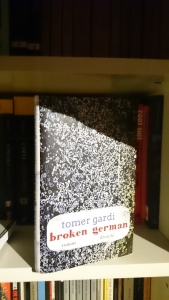
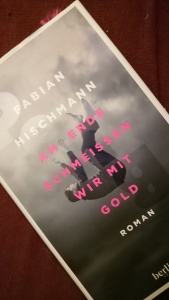
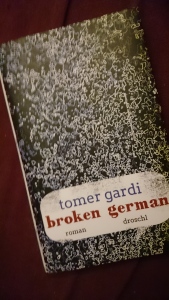

 Line Hoven’s art, consisting of stark black-and-white
Line Hoven’s art, consisting of stark black-and-white 
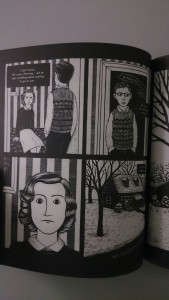


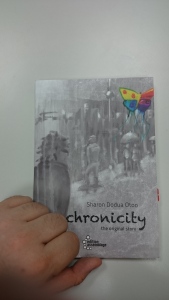

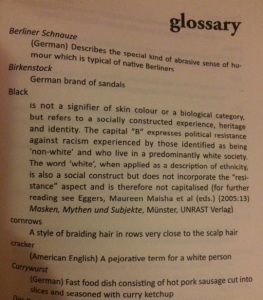
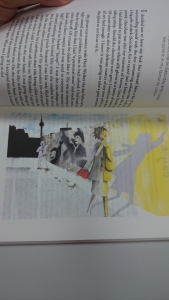
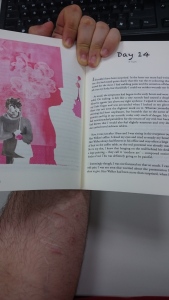
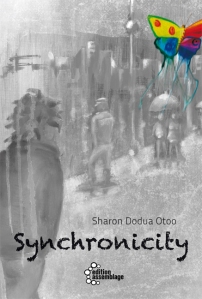















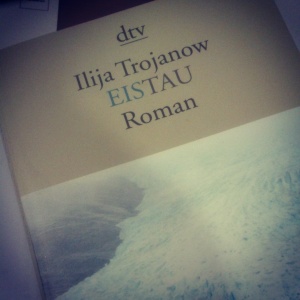 With this personal nature comes a narrative that is increasingly unreliable. After all, what we read is basically Zeno’s manifesto, a way to describe how he arrived at doing what he did. We are clearly supposed to read this book as being set in the tradition of Italo Svevo’s La coscienza di Zeno. Svevo’s book poses as the life story of Zeno, a middle aged Italian, one of modern’s literature’s most famous unreliable narrators, written by Zeno himself during/for psychoanalytic treatment. In his book we are offered accounts of his life, his marriage, his relationship to his father. Zeno’s ruminations on his life and his illness lead to the observation that his illness mirrors or corresponds to mankind’s sickness. This step from sentiments like Lowell’s “I myself am hell” to the idea that the narrator’s mind is not the only one that’s ‘not right’ is inherited from Svevo. Additionally, there’s a German-language (though mostly through Swiss writers) tradition following Svevo of novels which offer psychoanalytically prompted ‘autobiographies’, but this time the goal is to explain a crime or catastrophe that has happened. Of this tradition, Max Frisch is probably the writer most well known to non-German audiences. This referential pattern suggests that Trojanow’s Zeno, even though we only learn of his intent to do something out of the ordinary halfway through the story, must have intended something of the sort all along. There’s a second way in which the two Zenos, the one from Bavaria and his Italian predecessor, are connected, and that’s their relationship to women. Anyone who’s read Svevo’s book is left with the impression that Zeno’s relationship to the female gender can be a bit arduous at times, and significantly contributes to his malaise. There’s a certain amount of misogyny written into the novel, which helps us nail down the slippery character of Zeno a bit more. With Trojanow’s Zeno, we have a similar situation and just as with Svevo’s counterpart, we can’t but feel that his explanations and descriptions are a bit self serving.
With this personal nature comes a narrative that is increasingly unreliable. After all, what we read is basically Zeno’s manifesto, a way to describe how he arrived at doing what he did. We are clearly supposed to read this book as being set in the tradition of Italo Svevo’s La coscienza di Zeno. Svevo’s book poses as the life story of Zeno, a middle aged Italian, one of modern’s literature’s most famous unreliable narrators, written by Zeno himself during/for psychoanalytic treatment. In his book we are offered accounts of his life, his marriage, his relationship to his father. Zeno’s ruminations on his life and his illness lead to the observation that his illness mirrors or corresponds to mankind’s sickness. This step from sentiments like Lowell’s “I myself am hell” to the idea that the narrator’s mind is not the only one that’s ‘not right’ is inherited from Svevo. Additionally, there’s a German-language (though mostly through Swiss writers) tradition following Svevo of novels which offer psychoanalytically prompted ‘autobiographies’, but this time the goal is to explain a crime or catastrophe that has happened. Of this tradition, Max Frisch is probably the writer most well known to non-German audiences. This referential pattern suggests that Trojanow’s Zeno, even though we only learn of his intent to do something out of the ordinary halfway through the story, must have intended something of the sort all along. There’s a second way in which the two Zenos, the one from Bavaria and his Italian predecessor, are connected, and that’s their relationship to women. Anyone who’s read Svevo’s book is left with the impression that Zeno’s relationship to the female gender can be a bit arduous at times, and significantly contributes to his malaise. There’s a certain amount of misogyny written into the novel, which helps us nail down the slippery character of Zeno a bit more. With Trojanow’s Zeno, we have a similar situation and just as with Svevo’s counterpart, we can’t but feel that his explanations and descriptions are a bit self serving.











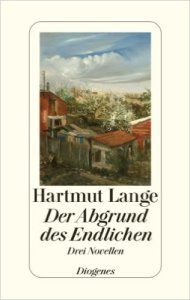 Among living German prose writers, Hartmut Lange is something of an oddity. He is what you’d call a writer’s writer, not really appreciated by critics, except in what must be described as a glancing way, not particularly successful with the public, but adored by writers such as Monika Maron and many other heavyweights. But, and here’s the odd thing, he doesn’t read like many other ‘writers’ writers’ do. He is a smooth, highly accomplished writer, a creator of taut and incredibly focused little works of art, texts that, at the same time, are light as feathers. There are few writers out there than can wear their erudition and their technical finesse this lightly and at the same time stun the reader who realizes what it is that has fallen into his lap there. Hartmut Lange should be one of Germany’s most celebrated writers, he’s one of its finest writers anyway, and Der Abgrund des Endlichen (~ The Abyss of the Finite), his most recent publication, certainly confirms this. Lange, these past decades, has become primarily a writer of stories and novellas, mainly novellas, and not since the days of Paul Heyse has this country known as dedicated a writer of novellas as Hartmut Lange and in his new book, he publishes three of them.
Among living German prose writers, Hartmut Lange is something of an oddity. He is what you’d call a writer’s writer, not really appreciated by critics, except in what must be described as a glancing way, not particularly successful with the public, but adored by writers such as Monika Maron and many other heavyweights. But, and here’s the odd thing, he doesn’t read like many other ‘writers’ writers’ do. He is a smooth, highly accomplished writer, a creator of taut and incredibly focused little works of art, texts that, at the same time, are light as feathers. There are few writers out there than can wear their erudition and their technical finesse this lightly and at the same time stun the reader who realizes what it is that has fallen into his lap there. Hartmut Lange should be one of Germany’s most celebrated writers, he’s one of its finest writers anyway, and Der Abgrund des Endlichen (~ The Abyss of the Finite), his most recent publication, certainly confirms this. Lange, these past decades, has become primarily a writer of stories and novellas, mainly novellas, and not since the days of Paul Heyse has this country known as dedicated a writer of novellas as Hartmut Lange and in his new book, he publishes three of them.












 All major literatures have writers in the critical spotlight, who reap all the laurels, who command all the attention. As a rule of thumb, you can find all of them on the idiotic lists of people complaining about how (and to whom) the Nobel Prize in Literature is awarded. And each of these literatures also has excellent second-tier writers, writers who are as good or better than those in the spotlight but who, for some reason or other, despite good reviews and decent enough sales never quite broke through. In Germany, one of those writers is Hartmut Lange. The excellence of his work deserves a wide audience, critical and popular, yet ever well-read people can be puzzled when asked about him. In recent interviews, Lange himself has turned to complaining about the critical bias against him and grumbling about his work being simply too ‘bold’ for the success that has been denied to him for decades. This is not to say that Lange has been altogether without success. He started his career as a playwright in the GDR, where he was successful, both with audiences as well as with critics. He won a major prize yet he then fell out of love with the ruling ideology and, in 1965, did not return from one of his trips to West Germany.
All major literatures have writers in the critical spotlight, who reap all the laurels, who command all the attention. As a rule of thumb, you can find all of them on the idiotic lists of people complaining about how (and to whom) the Nobel Prize in Literature is awarded. And each of these literatures also has excellent second-tier writers, writers who are as good or better than those in the spotlight but who, for some reason or other, despite good reviews and decent enough sales never quite broke through. In Germany, one of those writers is Hartmut Lange. The excellence of his work deserves a wide audience, critical and popular, yet ever well-read people can be puzzled when asked about him. In recent interviews, Lange himself has turned to complaining about the critical bias against him and grumbling about his work being simply too ‘bold’ for the success that has been denied to him for decades. This is not to say that Lange has been altogether without success. He started his career as a playwright in the GDR, where he was successful, both with audiences as well as with critics. He won a major prize yet he then fell out of love with the ruling ideology and, in 1965, did not return from one of his trips to West Germany.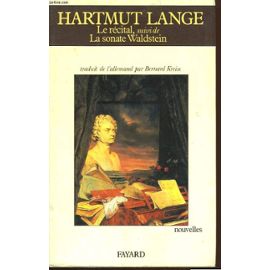 Another sign of his mastery is his use of the form of the novella. Instead of just putting out a piece of prose that’s too short to be a novel and too long to be a story, and slapping on it the label ‘novella’, he writes, consciously, a novella, a tight piece of prose. Theodor Storm, one of the most important writers in that form in German literature, called the novella “the sister of drama” and “the strictest kind of prose writing”, which is organized through a conflict that’s at the center of the whole construction. I’ve a feeling Hartmut Lange shares that view. Das Konzert is so tight that it’s, as with all books that are written this well, hard to imagine it being any longer despite the fact that the subject could make for quite a long novel. Lange, however, chose a structure and a central organizing metaphor that allows him to write a book of just over a hundred and thirty pages about a topic as vast and expansive as guilt and redemption after the atrocities of the Second World War. Although there are several concerts, the eponymous concert comes at the end, almost unannounced, unexpected, even, but we the readers still see that the whole book’s structure hangs on that concert and its outcome. The book even employs short bursts of violence but although that violence can seem harmless, it has a much more harsh effect on the readers. Again, as with other things, Lange makes the utmost of his use of violence.
Another sign of his mastery is his use of the form of the novella. Instead of just putting out a piece of prose that’s too short to be a novel and too long to be a story, and slapping on it the label ‘novella’, he writes, consciously, a novella, a tight piece of prose. Theodor Storm, one of the most important writers in that form in German literature, called the novella “the sister of drama” and “the strictest kind of prose writing”, which is organized through a conflict that’s at the center of the whole construction. I’ve a feeling Hartmut Lange shares that view. Das Konzert is so tight that it’s, as with all books that are written this well, hard to imagine it being any longer despite the fact that the subject could make for quite a long novel. Lange, however, chose a structure and a central organizing metaphor that allows him to write a book of just over a hundred and thirty pages about a topic as vast and expansive as guilt and redemption after the atrocities of the Second World War. Although there are several concerts, the eponymous concert comes at the end, almost unannounced, unexpected, even, but we the readers still see that the whole book’s structure hangs on that concert and its outcome. The book even employs short bursts of violence but although that violence can seem harmless, it has a much more harsh effect on the readers. Again, as with other things, Lange makes the utmost of his use of violence. Basically, for all we know, in Lange’s Ghost Berlin, there’s only dead Nazis and dead Jews (not all of them murdered, Liebermann died in his sleep). Most of the Nazis are deeply remorseful for what they did. Many of them, after all, did it for a higher cause, ‘saving the German race’ and it took death to show them the horrible delusion they were under. The passages dealing with this recognition are potent statements on the longevity (or the lack of it, as it happens) of ideologies, of death canceling out some illusions. The Nazis are the pariahs of Ghost Berlin, ashamed of themselves and shunned by the other occupants of the city. Schulze-Bethmann is one of the few who has regular contacts to them. As it turns out, the Nazis have as much interest in Lewanski regaining his powers as Frau Altenschul. They think that if he manages to mature as an artist despite their murdering him they will be saved, in a way. Art will free them, make them less contemptible. In the end, Lewanski has the choice between attending one of two concerts. One in front of Frau Altenschul and a large audience assembling to hear him, and one in front of an army of dead Nazis, hiding in what used to be the Führerbunker. His failure to play the piece he set out to play dashes the Nazis’ hopes and contains a direct indictment of Germans’ attempts in Lange’s time and the decade after the book’s publication, to extricate themselves from responsibility by erecting monuments and installing rituals of remembrance in schools.
Basically, for all we know, in Lange’s Ghost Berlin, there’s only dead Nazis and dead Jews (not all of them murdered, Liebermann died in his sleep). Most of the Nazis are deeply remorseful for what they did. Many of them, after all, did it for a higher cause, ‘saving the German race’ and it took death to show them the horrible delusion they were under. The passages dealing with this recognition are potent statements on the longevity (or the lack of it, as it happens) of ideologies, of death canceling out some illusions. The Nazis are the pariahs of Ghost Berlin, ashamed of themselves and shunned by the other occupants of the city. Schulze-Bethmann is one of the few who has regular contacts to them. As it turns out, the Nazis have as much interest in Lewanski regaining his powers as Frau Altenschul. They think that if he manages to mature as an artist despite their murdering him they will be saved, in a way. Art will free them, make them less contemptible. In the end, Lewanski has the choice between attending one of two concerts. One in front of Frau Altenschul and a large audience assembling to hear him, and one in front of an army of dead Nazis, hiding in what used to be the Führerbunker. His failure to play the piece he set out to play dashes the Nazis’ hopes and contains a direct indictment of Germans’ attempts in Lange’s time and the decade after the book’s publication, to extricate themselves from responsibility by erecting monuments and installing rituals of remembrance in schools.